|
|
| |
| EVENTS |
|
|
> Quality of Democracy assessed at 46% upon conclusion of 3rd Parliamentary Year
|
|
|
|
| |
Islamabad; March 15, On the completion of the 3rd Parliamentary year and government, the Democracy Assessment Group of PILDAT gave a 46% score to the quality of democracy in Pakistan, which stood at 45% upon the mid-term in September 2010. A diverse Democracy Assessment Group (DAG), convened by the PILDAT, carried out a comprehensive assessment based on an international democracy assessment framework reflecting the experience of democracies around the world. |
|
| |
Mr. Ilahi Baksh Soomro, former Speaker National Assembly and a member of Democracy Assessment Group. Chaired the PILDAT roundtable discussion on the Assessment of the Quality of Democracy in Pakistan, while Mr. Qamar Zaman Kaira, Secretary Information PPPP and former Federal Minister for Information, Mr. Ahsan Iqbal, spokesperson of the PML N, and Senator Nayyar Hussain Bukhari, Leader of the House in the Senate, spoke at the occasion including members of the Democracy Assessment Group Mr. Shahid Hamid, Senior Advocate Supreme Court, former Governor Punjab and former Federal Minister, Mr. Javed Jabbar, former Federal Minister, Mr. Ghazi Salahuddin, Columnist, Mr. Iftikhar Ahmad, Senior Analyst, Geo, Mr. Javed Hafeez, former Ambassador, Prof. Dr. Mohammad Waseem, Academician, Lt. Gen. (Retd.) Moinuddin Haider, former Governor and Federal Minister for Interior, Mr. Mujib-ur-Rehman Shami, Editor-in-Chief, Daily Pakistan and Mr. Ahmed Bilal Mehboob, Executive Director PILDAT also participated in the Roundtable Discussion. Many Parliamentarians, analysts, civil society representatives and media persons also participated in the roundtable discussion.
|
|
| |
Mr. Ilahi Baksh Somro said that democracy means rule of law. He said that independence of Judiciary is a positive aspect of democracy at the moment. |
|
| |
Mr. Shahid Hamid said that the objective of democracy assessment are to make democracy deliver and work. The assessment process is a tool to promote democratic reform. It is not meant just to assess the Government alone but assess the entire society. How democratic is the country or society as a whole of which the government is a part. He said the key message of the Assessment of the Quality of Democracy in Pakistan is that the status of Constitutional and institutional arrangements of Democracy are comparatively better than in most parts of our history. We have the basic ingredients of Democracy in place such but the state of governance, rule of law, accountability and integrity in public office are not satisfactory and need urgent improvements. |
|
| |
Mr. Javed Jabbar said that the score assigned to the quality of democracy is both accurate yet misleading at the same time. He said democracy has scored both positives and negatives. While the positives include activism of the Public Accounts Committee, Judicial activism, not calling of mid-term election by key political parties, a space for citizens and society to put the killers of Salman Taseer and Sdhahbaz Bhatti on the defensive, Government standing up to the US bullying on Raymond Davis case, etc., the negatives include grave sense of insecurity among non-Muslims and inability of the Government to take long-lasting decisions on key economic and governance issues among a host of others. He stressed that midterm election is not the solution of current political problems. |
|
| |
Mr. Qamar Zaman Kaira, while presenting his party�s views, explained in detail how the party tackled the issues of federal disparity through fiscal federalism in the shape of NFC and the 18th Constitutional Amendment. He cited Gilgit-Baltistan, Balochistan package and the party�s support and belief in winning back the space for liberal voices from extremism in the country. He believed that for strengthening democracy media, civil society and other stakeholders should play their role. He stressed that every citizen of Pakistan has to abide by the Constitution of Pakistan any ultra-constitution effort from any person, group or party will not be tolerated. |
|
| |
Mr. Ahsan Iqbal stressed that failures of the Government should not be counted as failure of the democracy by the citizens while evaluating democracy. He qualified that to evaluate democracy in Pakistan is not an easy task as it democracy has just come out of the shadows of dictatorship. Military rules leave the country and its systems weaker than before. He said that the biggest loss in last three years is the loss in consensus on issues such as, democracy being the only way forward, constitutional supremacy, independence of Judiciary, de-politicization of the army and economic revival. He said that 18th amendment is the biggest achievement, but still political role of the President of Pakistan is questionable. He said that troika government has re emerged. |
|
| |
Senator Hasil Bazinjo was of the view that no other country has given more scarifies for democracy in Pakistan. He believed that we are playing in foreign hands. He said that religious extremists are the biggest challenge to democracy in Pakistan. |
|
| |
Senator Nayyar Hussain Bukhari believed that democracy delivers as it is publicly accountable. Democracy should continue for reforms to continue.
Earlier Mr. Ahmed Bilal Mehboob said that as an indigenous organization working to strengthen democracy and democratic institutions, PILDAT has been carrying out a performance assessment of democracy and Parliament in Pakistan on an annual basis using its own format. It has now undertaken the task of annual assessment of democracy using an international criterion for the assessment of democracy developed by the International Institute of Democracy and Electoral Assistance (IIDEA) and the Democratic Audit for internationally and regionally comparable results. The PILDAT Democracy Assessment initiative does not end at commentary or analysis. The process is directed at identifying and lobbying for reforms using the collective influence of the Democracy Assessment Group. |
|
| |
|
|
| |

|
|
| |
|
|
| |

|
|
| |
|
|
| |
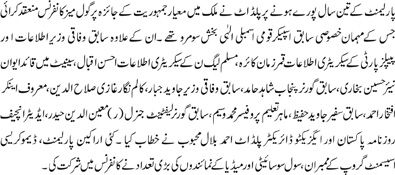
|
|
| |
|
|
| |

|
|
| |
|
|
| |
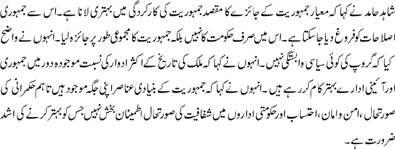
|
|
| |
|
|
| |
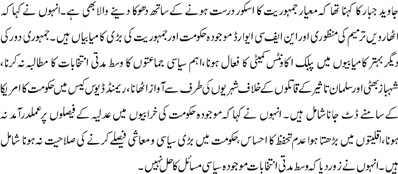
|
|
| |
|
|
| |
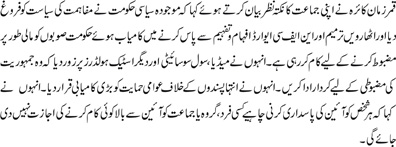
|
|
| |
|
|
| |
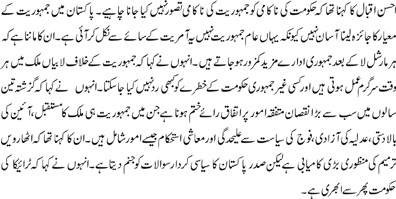
|
|
| |
|
|
| |

|
|
| |
|
|
| |

|
|
| |
|
|
| |

|
|
| |
|
|
| |
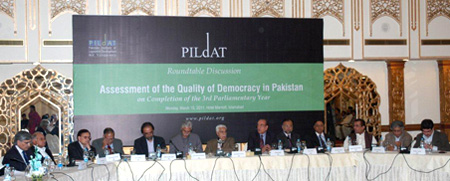
|
|
| |
|
|
| |

|
|
| |
|
|
| |
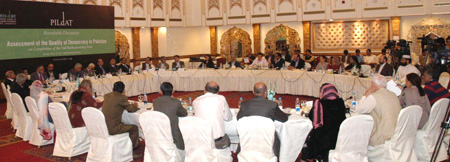
|
|
|
|
|
|
|
|
|